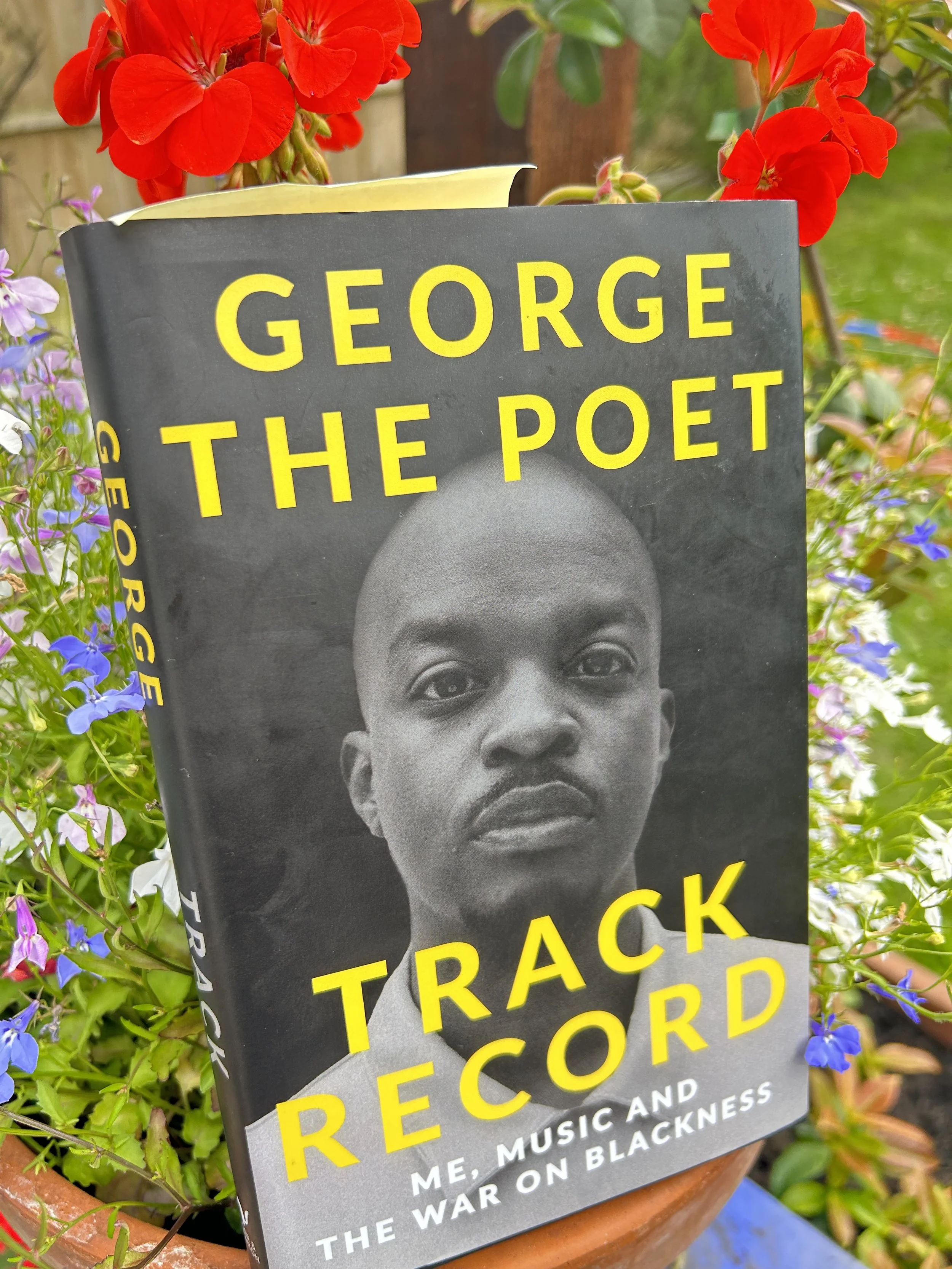‘Track Record’ by George the Poet: A Grass Roots Review
George the Poet, world-renowned spoken word artist, poet, rapper, award-winning podcast host and now author, recently released his much-anticipated autobiography ‘Track Record’.
The book is a combination of insight into George’s life interspersed with commentary on history, the ‘war on blackness’ and the music industry.
George Mpanga, more popularly known as George the Poet, grew up on the St Raphael’s Estate in Brent, North West London. And this is where his story starts; his home is central to his narrative, development and personal growth. It’s as if ‘Track Record’ speaks to me directly, being centred in my home borough, with references to familiar areas and services like Brent Summer University that used to exist, and that I also attended when younger. And I sadly recognise the high levels of social and economic deprivation and inequality that George speaks about.
I am also witness to the fact that George has very much been part of the community scene since as long as I can remember, he is a regular at local events, always happy to support and get involved. And when he speaks, it comes from a deep care for his community and for those suffering across the world; these values are also reflected in his book.
It has been insightful to read about George’s life in more detail, and to understand more about his background and how his journey has led him to where he is today.
As a child of parents of Ugandan heritage, he has a lot of pride in his culture and was always connected to his roots. His mum wanted George to be exposed to life outside of the estate and pushed him with his studies. As well as a passion and gift for music from a young age, he was also academically bright. After studying diligently under the strict tutelage of him mum, he attained a place at Queen Elizabeth’s School in Barnet, a prestigious grammar school which he attended from 2002 to 2009. This early schooling, although tough due the very differing cultural landscape he was used to, led George to secure a place to study Politics, Psychology and Sociology at King’s College, Cambridge (2010–2013).
George began performing rap and grime when he was 15 years old, and this love stayed with him throughout high school. He was besotted by music, making up lyrics in his spare time and he became involved in the local music scene. In Cambridge, he adapted his musical style into spoken word poetry as a way of communicating his views more effectively with his new-found audience.
The lyrics that George uses are very much grounded in social and political issues, the imbalance of power, justice and ‘the war on Blackness’. He became interested in these topics, because he grew up surrounded by inequality, poverty, exclusion, youth crime and gangs. Hip Hop was very appealing to George as it was for many young people in this environment because it gave an outlet and a voice where there was none. Hip Hop was a way to speak up about injustices and discrimination. However, there was a negative culture that started surrounding Hip Hop which George’s mum wasn’t comfortable with, and that he himself started to question in older years. “I’d say Hip Hop’s overwhelming anger at social injustice died in 1996 with the murder of Tupac. After him, the genre’s biggest stars were no longer outsiders or threats to the mainstream; they were insiders, embedded in the neoliberal status quo.”
Being from a global majority background and growing up in the diaspora, I totally relate to George’s words about often feeling like you don’t belong amongst all the racism, Islamophobia and deeply entrenched inequalities. However, George speaks about a big life changing moment for him when he travelled to his parents’ homeland of Uganda just before going to study at Cambridge. He says the trip “changed my life”. He felt a sense of belonging which he didn’t feel in the UK. Race wasn’t a factor in Uganda, although the legacy of colonialism and inequality affected the people in other ways. Ugandans were generally happy, and Black people were not ‘othered’ as they were in the west.
A large part of George’s journey to date has been about educating himself on his people’s history and also that of colonialism and its legacy. This journey plays in parallel to his musical development and career direction. George makes a very interesting point about the realisation that although he reached this dream of attending Cambridge University, one of the most prestigious educational establishments in the world, he actually learned nothing there about ‘blackness’ or the history of empire. “The university didn’t see Blackness as a viable academic field – a view that pervades Western academia to this day.” He states that this learning took place in his own time, and reading books that were not western propaganda.
Through his ‘self-education’ and life experience, George transformed from what he called a ‘Black liberal’ to a ‘Black radical’. He no longer felt that equality could be achieved within the confines of the existing system that was created by white supremacists to rule over and control anyone who was ‘non-white’. He, like many other historians, activists and Black radicals, believe that colonialism has not ended but has just been coached in fluffy language and programmes that offer no real change, but keep the masses distracted from their subjugation.
George talks about global issues and explores the historical and root causes. These are extremely relevant to ordinary people on the ground, and relatable to where George grew up in North West London. The economic exploitation, deprivation, inequalities across all levels faced by communities are the result of the bigger picture and the ongoing exploitation of Africa and the rest of the world. The two are inextricably linked.
The so-called independence movements in the ex-colonies were a smoke screen according to George. The newly ‘free’ states had a huge amount of debt imposed on them which in reality they would never escape. That led to mass immigration to the West, as people needed work and money to feed their families. And this in turn led to the creation of places like St Raphael’s Estate. “Eventually, the threat of Black and Brown self-determination was crushed under the weight of crippling debt, imposed by the West on the rest. This debt caused much of the migration that led to St Raphael’s Estate becoming home to thousands of people from Jamaica, Barbados, Grenada, Pakistan, and even a few Ugandans.”
This power imbalance also remains, because people from the global majority rely on the system for livelihoods. In order to work your way out of economic hardship, you need to educate yourself in the western system, get a job within an unequal hierarchy and accept your place as there is no other option if you want to make money. George believes that is a big part of what keep us tied to the system. “These are all part of the deal: you get to live better than everyone else, but only if you play along.
George is a big advocate of decolonising one’s minds by making a conscious effort to self-educate. He writes that we have been programmed in systems that have taught us to feel inferior and also view white people and their systems as superior. In this light, he famously rejected his MBE in 2019 which was a big deal for a young up-and-coming artist, but shows his principled stance. “For the privilege of letting this empire claim me – I got to wear its logo like a badge of honour next to my name.” he continues, “I knew I couldn’t accept the MBE. The choice was already made for me by the wording of this ‘honour’. I wasn’t necessarily anti-monarchy at this time, but I wasn’t about to co-sign the whole idea of empire by attaching those words to my name.”
A key theme in the book is obviously music. George links the importance of music to black people, and how it was used as a tool for fighting injustice, community organising and self-expression. However, he feels that black music has been exploited by white people in positions of power and black people don’t benefit as a whole from their natural musical abilities and genius. “Its no coincidence that this success hasn’t enriched the Black working class that produced it… its mostly because the best Black music can achieve under capitalism… is profit. Not change.”
George talks from a position of knowledge, as he had to learn the hard way about exploitation by the music industry. He signed a record deal and then was not allowed to release his harder-hitting pieces of work. He realised that the music industry was solely about making money and supported the racist power structure. He didn’t like feeling he was being used, and groomed to be selfish and egotistical. Although the temptation was initially strong for the fame and money, George resisted the pull and decided he wanted to do music in his own way. Since then, George’s musical journey has been about personal growth and reflections on life. George says: “As I became focused on creating my own ethical pathway to success, I slowly accepted the limitations that came with it.”
Track Record is honest, self-critical and really reflects the life of a man who grounded in community. The journey for George is about challenging the self, the ego and fighting injustice. Although being labelled by a privileged, arrogant white man at a party as the ‘Cambridge Man’, he reminds the reader that he never forgets his roots. He says: “I’m one hundred per cent sure that the complexity of my course material at Cambridge influenced me to push myself lyrically…All the validation I needed came from the community that taught me how to rhyme in the first place.”
I highly recommend reading this book about the life of a principled man who has walked away from the magnetic lure of the system to try and live a life based on ethics and justice. The path has not always been easy as he describes, and has involved a lot of self-reflection and making mistakes along the way. George’s journey is inspirational, and a lived example of what you can achieve when you chart your own path. He ends the book with the words: “I am prepared to follow the truth wherever it may take me.”



